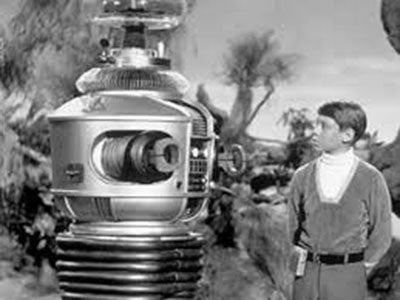Elizabeth Cook: Make work great again; first, unplug all the robots
Published 12:15 am Sunday, July 2, 2017

- On "Lost in Space," which aired from 1965 to 1968, the robot and Will Robinson, played by Billy Mumy, were constant companions.
The TV series, “Lost in Space,” fascinated a generation in the late 1960s as the family Robinson used futuristic technology to survive in a hostile universe.
The show stretched the imagination. For instance, the mother put a package in a boxlike machine, pushed a button and, voila, dinner emerged.
It seemed ludicrous. Yet at least once a week I pop a Lean Cuisine into the microwave, go about my business for a few minutes and — ding! — lunch is served.
Then there was the show’s robot, an imposing metal figure with claws for hands and a glass bubble for a head. A light on its chest flashed in sync with its mechanical speech.
Think of it as Siri on wheels.
The robot processed data and answered questions, and it became a de facto member of the family. Now and then, particularly when dealing with emotions, the robot would intone, “That does not compute.”
That became our buzz phrase. Clean my room? That does not compute.
The robot protectively trailed the Robinsons’ child prodigy, 9-year-old Will. At pivotal points in the plotline, the robot would flap its arms and warn, “Danger, Will Robinson! Danger!”
The robot was sci-fi fantasy in the 1960s, and it may still seem unlikely today. That’s only because our personal computers took different, more portable shapes. And we may not have robot watchdogs, but we are warned by everything from home security systems to sensors on cars that beep when you’re about to hit something.
Heck, I bet the Robinsons’ space mobile could not parallel park itself.
Now we hear about robots on another front, and they’re neither protective nor entertaining. They’re coming for our jobs.
So says the Robocalypse crowd that embraces Oxford University reseachers’ conclusion in 2013 that 47 percent of U.S. jobs were at risk of automation.
Forty-seven percent.
On the less dark side, a report by a different group — the Organization for Economic Cooperation and Development — said only 9 percent of jobs are at risk.
Donnie Charleston of the Institute for Emerging Issues raised this topic at last month’s Growing Rowan meeting. He cited a report that projected the probability of robots or automation displacing different jobs. Watch out, cashiers, bookkeepers — and people in a lot of other professions.
The trend started long ago. First, technology helped textile workers; it developed a system to remove cotton dust from the air, eradicating brown lung disease.
Then technology automated many of the workers’ jobs and sent them home.
Finally, technology helped companies oversee vast global operations. They shipped textile jobs overseas, shaving every penny possible to boost the bottom line.
Danger, Will Robinson!
Why doesn’t someone develop a technology to do what we really need — a technology that creates jobs instead of eliminating them?
Not to sound like a Luddite, but how can you call ever-increasing automation progress if it negatively affects so many lives — if it makes people obsolete?
That does not compute.
Wouldn’t you agree that life was better when you could get a human being on the phone instead of an automated voice that sent you into a maze of options? Press one if you agree.
To be sure, technology has improved our lives in many ways. And it creates some jobs — someone has to design the robots and assemble the iPhone 986s — but not as many jobs as it replaces, and often not in the United States. Besides, how long do you think it’ll be before robots will build robots?
When it comes to human survival, we don’t need a faster computer chip or a more pervasive social media platform — though lots of research and money goes into both.
We need more jobs that pay well. This is the greatest challenge of our time: reversing the loss of middle-class jobs.
More than 80 years ago, economist John Maynard Keynes warned of “technological unemployment” and called it a “new disease.”
Put technology to work on that. We need a cure.
Elizabeth Cook is editor of the Salisbury Post.

